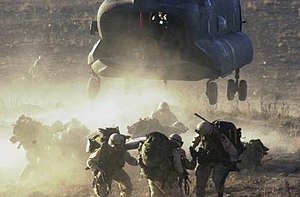James Jay Carafano:
March 2002: "Operation Anaconda."
U.S. forces were chasing down the last organized groups of Taliban and al Qaeda fighters in Afghanistan. Capt. Nelson Kraft's troops fanned out across the Shahi Kowt Valley ... and found more bad guys than they were looking for.
Mortar rounds, rifle fire and smoke bathed the battlefield. "We were fighting off, in my best estimate, 50 to 100 [enemy fighters] in the west, 50 to 100 in the east, and 50 to 100 to our north," Kraft recalls. "They were popping in and out of the [ravines] and heading toward our position."
That desperate fight helped teach a valuable lesson: Stateside marksmanship training, where soldiers took pot shots at static targets without the distractions of chaotic battle sounds and sights, left riflemen poorly prepared for the moving battles of Afghanistan and Iraq.
The Marine Corps quickly drafted a "requirement" for more realistic training targets. Enter a small Australian technology company, Marathon Robotics, inventor of "smart targets."
Marathon mounts human-shaped targets on Segways programmed to dart about a firing range the same way Taliban fighters dash from cover to cover. Sophisticated computers let the targets move autonomously. Clothed in armor, they can take repeated hits.
The Marines knew about Marathon Robotics only because of the Foreign Comparative Test program. Started in the 1990s, the FCT initiative lets U.S. forces test and evaluate foreign technologies that might satisfy our defense needs. It just makes sense. Why spend money for research and development -- and spend years waiting or it to bear fruit -- if the Pentagon could just buy what it needed off the shelf?
Since its inception, the FCT program has expedited delivery of much-need capabilities to American men and women on the battlefield. Dozens of successful programs have been conducted through the years. Last year, Marathon Robotics received a $50 million contract from the Marine Corps.
Programs like the FCT initiative save money, enhance the capacity of U.S. forces, and strengthen ties with friends and allies like Australia. So guess what is reportedly on the list for cuts in the Pentagon budget? That's right, the money-saving Foreign Comparative Test program.
...
It sounds like a good program. I recall live fire drills where we were moving toward an objective and we would face pop up targets, but they did not have the realism of the moving targets. It is an example of how training has advanced and we should make sure our troops have this. It is probably more important than some of the hardware in the pipeline.
 Image via Wikipedia
Image via Wikipedia
Comments
Post a Comment